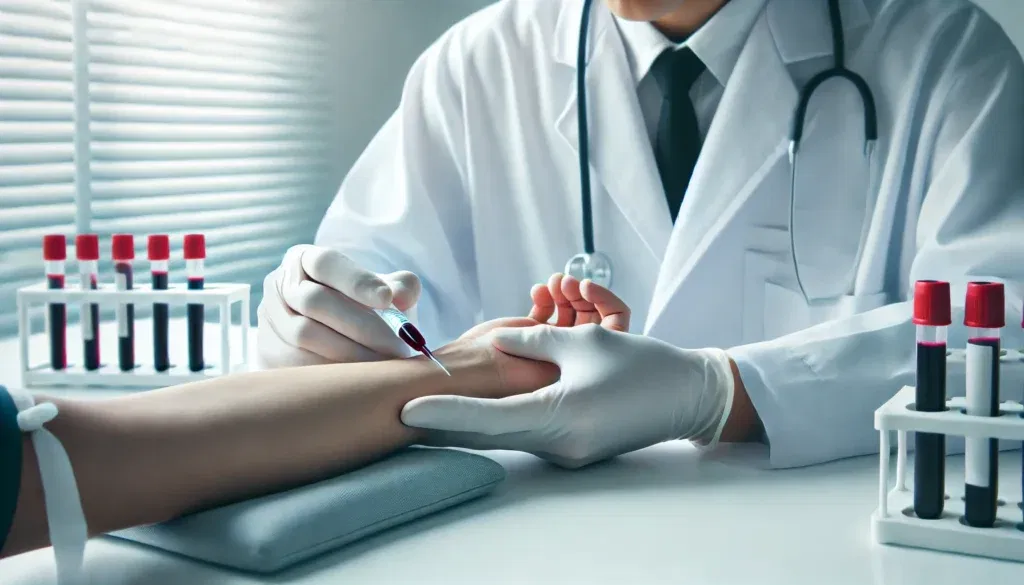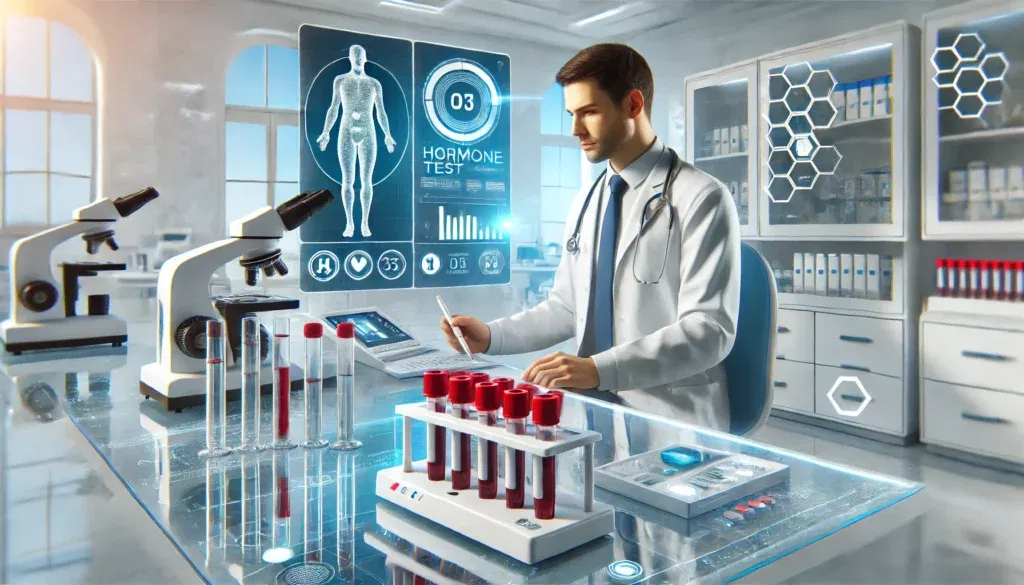Maintaining optimal hormone health is essential for overall well-being, particularly for men who may experience shifts in testosterone levels over time. Testosterone plays a critical role in various bodily functions, including muscle growth, bone density, mood regulation, and sexual health. Understanding whether your testosterone levels are within a healthy range can provide valuable insight into your overall health and help prevent long-term complications. If you’re searching for “testosterone test near me,” you may wonder how to choose a reliable provider. Ensuring that you select a reputable clinic or laboratory is vital, as accuracy, professionalism, and proper interpretation of results can significantly impact your next steps toward improved health.
You may also like: How to Get Your Testosterone Levels Checked: Best At-Home and Lab Testing Options
Understanding Testosterone Testing: Why It Matters
Testosterone testing is a critical tool in assessing hormonal health and identifying potential imbalances that could lead to symptoms such as fatigue, decreased libido, weight gain, and mood swings. While fluctuations in testosterone levels are natural with age, abnormal changes can indicate underlying health concerns such as hypogonadism, metabolic disorders, or thyroid dysfunction. Recognizing the signs that warrant a testosterone test can help you seek medical attention before these issues escalate.
A testosterone test typically involves measuring total and free testosterone levels in the blood. Total testosterone includes both bound and free testosterone, while free testosterone represents the bioavailable form that actively affects bodily functions. Some tests also assess other hormones such as luteinizing hormone (LH) and sex hormone-binding globulin (SHBG) to provide a more comprehensive view of hormonal balance. When considering a testosterone test, it is essential to understand what the results mean and how they correlate with your symptoms and overall health.

Where to Get a Testosterone Test Near Me: Types of Providers
When searching for “testosterone near me,” you’ll find several types of providers offering hormone testing. Each option has its advantages, depending on your needs, budget, and preferences. Knowing the differences between providers can help you make an informed decision about where to get tested.
Primary Care Physicians and Endocrinologists
Visiting your primary care physician (PCP) or an endocrinologist is one of the most reliable ways to obtain a testosterone test. Your doctor will evaluate your symptoms, order the necessary tests, and interpret the results in the context of your overall health. They may also check for other potential contributing factors, such as thyroid disorders, diabetes, or cardiovascular issues. The benefit of seeing a doctor is that they can provide a holistic assessment and recommend appropriate treatment options if your testosterone levels are abnormal.
Specialized Men’s Health Clinics
Men’s health clinics specialize in hormone health and typically offer comprehensive testosterone testing services. These clinics focus on issues such as low testosterone, erectile dysfunction, and overall wellness, providing a more targeted approach than a general healthcare provider. Many men’s health clinics also offer testosterone replacement therapy (TRT) if needed, making them a convenient option for those seeking treatment and ongoing monitoring.
Walk-In Labs and Diagnostic Centers
Independent laboratories and diagnostic centers offer convenient and accessible testosterone testing without requiring a doctor’s visit. Companies like Quest Diagnostics, Labcorp, and Health Testing Centers provide direct-to-consumer hormone testing, allowing you to order a test online, visit a local lab for a blood draw, and receive results electronically. This option is ideal for those who want quick results without scheduling a doctor’s appointment. However, it is crucial to consult a healthcare provider to interpret the results accurately.
Online Telehealth Services
Telehealth platforms have revolutionized healthcare accessibility, providing virtual consultations and at-home testing kits. Companies like Everlywell, LetsGetChecked, and Hone Health offer testosterone testing kits that allow you to collect a blood sample using a finger prick and mail it to a certified lab. Results are typically available within a few days, accompanied by professional insights or virtual consultations with a healthcare provider. This option is particularly beneficial for those who prefer privacy and convenience.
Choosing a Trusted Provider: Key Factors to Consider
Selecting a reputable provider is crucial to ensure accurate results and appropriate follow-up care. Several factors should guide your decision when choosing where to get tested.
Accreditation and Certification
Ensure that the testing provider is accredited by recognized healthcare organizations, such as the College of American Pathologists (CAP) or the Clinical Laboratory Improvement Amendments (CLIA). Accreditation guarantees that the facility meets high-quality standards for testing accuracy and reliability.
Test Accuracy and Methodology
Different labs may use various methods to measure testosterone levels, such as immunoassays or liquid chromatography-mass spectrometry (LC-MS). The latter is considered the gold standard for hormone testing due to its high accuracy. Inquire about the methodology used by the provider to ensure reliable results.
Physician Oversight and Consultation
Interpreting testosterone test results can be complex, requiring professional guidance. Choose a provider that offers physician oversight, allowing you to discuss your results with a qualified healthcare professional who can recommend appropriate treatment options if necessary.
Turnaround Time and Convenience
Consider the speed at which results are available and the overall convenience of the testing process. Walk-in labs and telehealth services often provide faster turnaround times than traditional doctor’s offices, making them preferable for those seeking quick answers.
Understanding Your Test Results and Next Steps
Once you receive your testosterone test results, it’s essential to understand what they mean and whether further action is necessary. Normal testosterone levels vary depending on age, health status, and laboratory reference ranges. If your levels fall outside the normal range, consult a healthcare provider to determine the underlying cause and explore potential treatment options.
If your testosterone levels are low, lifestyle modifications such as exercise, weight management, and proper nutrition can help support hormonal balance. In some cases, medical interventions such as testosterone replacement therapy may be necessary. Conversely, abnormally high testosterone levels may require further evaluation to rule out underlying medical conditions.

Frequently Asked Questions (FAQ) on Testosterone Testing and Treatment
1. How do I know if I need a testosterone test near me?
Testosterone levels can fluctuate due to age, lifestyle, and medical conditions. Symptoms such as fatigue, low libido, mood swings, and muscle loss may indicate a hormonal imbalance. If you experience persistent symptoms, searching for a “testosterone test near me” can help you locate a nearby medical provider. Consulting with a healthcare professional ensures proper evaluation of your symptoms and helps determine if a test is necessary. Early detection allows for timely intervention and better health outcomes.
2. What should I expect during a testosterone test near me?
A testosterone test is typically a simple blood test performed at a clinic or diagnostic lab. It measures your total and free testosterone levels to assess hormonal balance. Many healthcare facilities offering a “testosterone test near me” provide both walk-in and appointment-based services. The test is quick, usually requiring a small blood sample drawn from your arm, with results available within a few days. Discussing your results with a medical professional helps determine whether further testing or treatment is necessary.
3. Are home testosterone tests as reliable as in-clinic testing?
Home testosterone test kits offer convenience but may not be as accurate as tests conducted in a professional setting. Factors such as sample contamination, improper handling, or delayed processing can affect results. While a home kit can provide a preliminary assessment, a confirmatory “testosterone test near me” at a medical facility is recommended for accurate diagnosis. If an at-home test indicates abnormal levels, seeking professional evaluation ensures a comprehensive approach to managing your health. Medical-grade testing also allows for additional diagnostic insights beyond testosterone levels alone.
4. What factors can influence my testosterone test results?
Several factors can impact testosterone levels, including diet, exercise, stress, sleep, and medical conditions. Medications such as corticosteroids, opioids, and hormonal treatments may also affect results. To ensure accurate readings, healthcare providers often recommend fasting and scheduling morning appointments when testosterone levels are highest. Before searching for a “testosterone test near me,” consult with your doctor about any medications or lifestyle habits that might influence your test. Understanding these factors allows for a more precise assessment and better treatment planning.
5. What are the benefits of getting a testosterone test near me?
Testing provides critical insight into your hormonal health, helping diagnose conditions such as hypogonadism or other endocrine disorders. Local testing facilities ensure convenience, timely results, and professional guidance. A “testosterone test near me” can also assist in optimizing treatment plans for those undergoing testosterone replacement therapy (TRT). Identifying deficiencies early enables proactive steps to improve energy, mood, and overall well-being. Additionally, regular testing allows for monitoring of hormone therapy effectiveness.
6. How do I choose the best provider for testosterone testing near me?
Selecting a reputable provider ensures accurate results and reliable care. Look for accredited labs, board-certified endocrinologists, or urologists specializing in hormone health. Reading patient reviews and verifying provider credentials can help you find a trustworthy “testosterone test near me.” Some clinics offer comprehensive hormone panels to assess overall health beyond testosterone levels. Asking about insurance coverage, turnaround time, and consultation availability can further refine your choice.
7. Can lifestyle changes improve testosterone levels naturally?
Yes, lifestyle factors significantly impact testosterone production. Regular exercise, particularly strength training and high-intensity interval training (HIIT), supports hormonal balance. A diet rich in healthy fats, lean protein, and micronutrients like zinc and vitamin D is beneficial. Reducing stress and ensuring quality sleep also contribute to maintaining optimal testosterone levels. Even if your “testosterone test near me” results indicate a deficiency, natural interventions may complement medical treatment for better long-term health.
8. What treatment options are available if my testosterone levels are low?
Treatment options vary based on severity, symptoms, and underlying causes. Testosterone replacement therapy (TRT) is a common solution, available in injections, patches, gels, or pellets. However, not everyone with low testosterone requires TRT—lifestyle modifications, medication adjustments, or addressing sleep disorders may help. Before seeking “testosterone near me” for treatment, discuss all available options with your doctor. They can guide you on the safest and most effective approach tailored to your health needs.
9. Are there risks associated with testosterone therapy?
While TRT can be highly effective, it comes with potential risks, including increased red blood cell count, acne, fluid retention, and prostate concerns. Long-term use requires careful monitoring to prevent complications. Choosing a trusted provider for “testosterone near me” ensures proper dosage, monitoring, and management of side effects. Routine follow-ups help track progress and make necessary adjustments to maintain safe and effective treatment. Individuals with certain conditions, such as heart disease or clotting disorders, should discuss potential risks with their healthcare provider.
10. How often should I get my testosterone levels checked?
The frequency of testing depends on individual health status, symptoms, and whether you’re undergoing treatment. Men on TRT typically require periodic monitoring every 3-6 months. If you experience symptoms of hormonal imbalance, scheduling a “testosterone test near me” can help determine whether follow-ups are needed. Preventative testing is also beneficial for men over 40, as natural testosterone decline occurs with age. Regular evaluations help maintain hormonal balance and prevent long-term health complications.

Conclusion: Taking Charge of Your Hormone Health
Prioritizing hormone health by getting a testosterone test can provide invaluable insights into your overall well-being. Whether you choose to visit a doctor, a men’s health clinic, a walk-in lab, or an online telehealth service, selecting a trusted provider ensures accurate results and appropriate guidance. If you’re searching for “testosterone test near me,” consider factors such as accreditation, test accuracy, physician oversight, and convenience when making your decision. Understanding your testosterone levels empowers you to take proactive steps toward optimizing your health, improving energy levels, and enhancing your overall quality of life. By staying informed and working with reputable providers, you can make well-informed choices that support long-term well-being.
testosterone testing locations, hormone health assessment, low testosterone diagnosis, men’s health clinics near me, hormone imbalance symptoms, TRT therapy options, testosterone deficiency solutions, online hormone testing, best labs for testosterone tests, reliable men’s health providers, blood test for testosterone levels, endocrine health screening, home testosterone testing kits, medical labs near me, primary care hormone evaluation, signs of low testosterone, free and total testosterone testing, walk-in lab hormone check, men’s wellness and longevity
Further Reading:
Testosterone Tests: What to Know and Our Experience
What’s the best way to test for low testosterone?
Disclaimer: The information provided in this article is for general informational purposes only. The content does not constitute professional advice of any kind, including but not limited to medical, legal, or financial advice. HisHealthMag and its contributors make no representations or warranties regarding the accuracy, completeness, or reliability of the information presented. Always seek the advice of a qualified professional for any specific concerns or questions you may have. Neither HisHealthMag nor its authors assume any responsibility or liability for any actions taken based on the information provided in this article. The views and opinions expressed are those of the author(s) and do not necessarily reflect the official policy or position of HisHealthMag.





